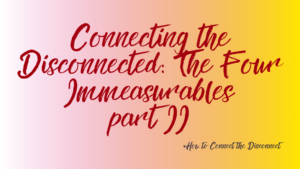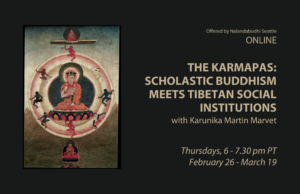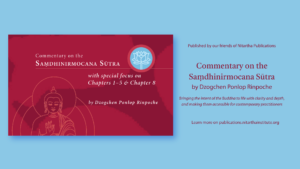Pandemic. Racist violence. Forest fires. I look at the headlines, and I am overwhelmed. What can I possibly do? This question prompts a habitual response: turn away, protect myself, numb out. How can I shift this? How can I forge a connection with suffering people rather than feel a recoiling sort of pity?
Buddhism speaks of ignorance as one of the three afflicting mental states. This ignorance is not just a lack of knowledge but a dulling of our natural heartfelt curiosity about the world, about the way things are. Ignorance also describes our failure to recognize how we are connected with others and with our environment—impacting and impacted by the whole world.
Practice
When I start to experience my habitual reaction to breaking news, I try one of the practices in Interconnected: Embracing Life in Our Global Society (2017) by His Holiness the 17th Karmapa, Ogyen Trinley Dorje. Consider trying them yourself and see if things shift for you.
- When you hear about a tragedy, try to relate to the people, not just to their suffering. Perhaps footage of a crowded refugee camp includes a sad and exhausted woman offering a child some food. We can follow our curiosity and connect to her. Is this a mother caring for her own child? Or someone else’s? Is she actually a mother, or only responding from kindness as she gives to this child? Catastrophic situations always include courageous acts of kindness and love. As we observe those moments, we may appreciate another human being’s goodness. We may aspire to show similar kindness and unselfishness when the opportunity arises—even if we feel tired and scared.
- Get active by practicing generosity—any form, any amount. Offering something can empower ourselves, especially when we expand our view of what we can give—our time, interest, appreciation, resources. If the news brings us in contact with a tragedy far away, we might discover where displacement and hunger are occurring closer to home, in our own communities. We can offer whatever we can to help others directly in the short term, and also find ways to build the resilience needed to keep engaging, keep noticing, and keep living our connection with the wider world.
- When viewing others’ suffering, actively broaden your focus to consider the causes of that suffering. Understanding how we might be contributing from a distance to people’s problems and how we might contribute to solutions can be an antidote to feelings of helplessness. Even if systemic problems like mass incarceration or housing inequality do not directly affect us, we can explore how we unwittingly benefit from others’ suffering and how we can begin to dismantle what maintains it.
For me, these practices work to undo the ignorance that shuts down my curiosity, as if shielding me. Ignoring the truth does not change the way things are and actually protects no one. So bit by bit, we dare to open our hearts to the world.

A student of Dzogchen Ponlop Rinpoche since 2015, clinical psychologist Ellen Balzé began working with the core Path of Mindful Activity team in 2018. Collaborating with other Nalandabodhi members on various projects has created precious opportunities for her to pause, relax, and reflect. She enjoys baking bread and caring for succulents.






